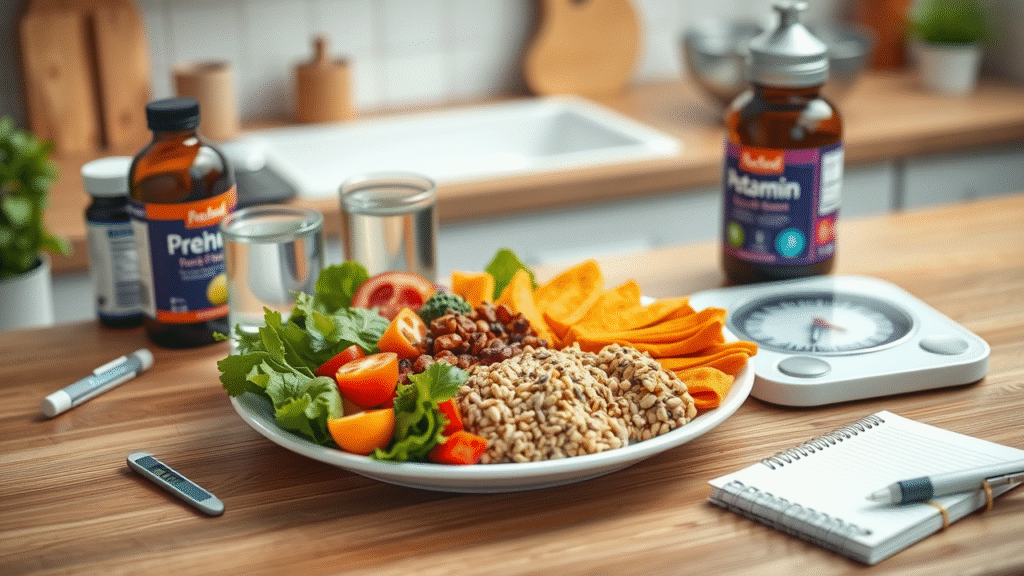A healthy pregnancy diet is essential from the very moment of conception through delivery, laying the foundation for both maternal wellness and fetal growth. This guide explores key nutrition principles, from vital nutrients that support early development to adjusting calories and hydration as pregnancy progresses. It also covers managing food safety, balancing macronutrients for sustained energy, and incorporating prenatal supplements wisely. You’ll learn how to monitor weight gain, ease common digestive challenges, and plan postpartum nutrition for recovery. Together, these interconnected elements form a comprehensive approach to nourishing both mother and baby throughout this transformative journey.
Essential Nutrients and Their Role in Supporting a Healthy Pregnancy from Conception Onward
Essential nutrients form the foundation of a healthy pregnancy diet from conception onward, playing a vital role in supporting both maternal well-being and fetal development. Key vitamins and minerals such as folic acid, iron, calcium, and omega-3 fatty acids are crucial for preventing birth defects, promoting brain growth, and maintaining maternal energy reserves. This nutrient focus intersects with balancing macronutrients to sustain energy levels and fetal growth throughout pregnancy. Adequate intake of these essential nutrients also guides adjustments in caloric needs by trimester, ensuring optimal health without excessive weight gain. Incorporating prenatal vitamins complements dietary sources to fill nutritional gaps safely. Moreover, understanding these nutrients helps manage digestive changes and supports food safety practices to avoid harmful substances that could compromise nutrient absorption or fetal health. Finally, a strong nutrient foundation established during pregnancy sets the stage for creating a sustainable postpartum nutrition plan that fosters recovery and long-term wellness after delivery.
Adjusting Caloric and Hydration Needs Throughout Each Trimester for Optimal Maternal and Fetal Health

Adjusting caloric and hydration needs throughout each trimester is crucial for optimizing both maternal health and fetal growth. As pregnancy progresses, energy demands rise to support the developing baby, placenta, and expanding maternal tissues, making it essential to align calorie intake with these changing requirements. Proper hydration also supports increased blood volume and amniotic fluid levels, aiding nutrient transport highlighted in sections on essential nutrients and balancing macronutrients. Tailoring these adjustments helps prevent excessive weight gain discussed elsewhere in the blog while ensuring sufficient fuel for fetal development. These evolving needs reinforce the importance of monitoring food safety and supplement use to avoid harmful substances that could disrupt this delicate balance. Moreover, adequate fluids can alleviate common digestive discomforts explored in related sections, fostering overall well-being. Ultimately, understanding how caloric and hydration demands shift across trimesters provides a foundation for creating a sustainable nutrition plan that supports recovery postpartum and promotes long-term maternal wellness after delivery.
Managing Food Safety and Avoiding Harmful Substances During Pregnancy for Baby’s Well-being
Managing food safety and avoiding harmful substances during pregnancy is critical to protecting the baby’s well-being throughout gestation. Expectant mothers must be vigilant about choosing safe foods, steering clear of raw or undercooked meats, unpasteurized dairy, and certain seafood known for high mercury levels. These precautions complement the blog’s broader focus on essential nutrients and balanced macronutrients, ensuring that beneficial foods do not pose risks. Proper food handling also supports digestive health by reducing exposure to pathogens that can cause gastrointestinal issues common in pregnancy. Additionally, this careful approach aligns with monitoring weight gain and hydration needs since illness can disrupt both appetite and fluid balance. Incorporating prenatal vitamins becomes even more important when dietary restrictions limit nutrient sources. Overall, managing food safety underscores the interconnected nature of nutrition guidelines from conception through delivery, forming a foundation for both fetal development and maternal health that continues into postpartum recovery planning.
Balancing Macronutrients to Support Energy Levels and Fetal Development During Pregnancy

Balancing macronutrients is a cornerstone of maintaining steady energy levels and fostering healthy fetal development throughout pregnancy. Proper proportions of carbohydrates, proteins, and fats provide the essential fuel for both mother and baby, supporting cellular growth, brain development, and overall vitality. This balance works hand in hand with the specific essential nutrients detailed earlier in the blog, ensuring that each calorie consumed contributes meaningfully to maternal and fetal needs. As caloric requirements shift across trimesters, adjusting macronutrient intake accordingly helps meet evolving demands without excess weight gain—a topic explored further in the section on monitoring weight gain. Additionally, a well-rounded macronutrient profile supports digestive health by preventing common discomforts linked to imbalanced diets. Combined with mindful hydration and safe food practices discussed elsewhere in the blog, mastering macronutrient balance creates a solid nutritional foundation that prenatal vitamins complement effectively. This approach ultimately facilitates optimal outcomes from conception through delivery and lays groundwork for postpartum recovery.
Incorporating Prenatal Vitamins and Supplements to Enhance Nutritional Intake Safely During Pregnancy
Incorporating prenatal vitamins and supplements is a vital strategy to safely boost nutritional intake during pregnancy, complementing the balanced diet emphasized throughout the journey from conception to delivery. These supplements provide essential micronutrients like folic acid, iron, and DHA that support fetal development and maternal health, as discussed in the section on essential nutrients. While adjusting caloric needs each trimester ensures energy demands are met, supplements fill nutritional gaps that food alone might not cover. Proper supplementation also aids in managing common digestive challenges highlighted elsewhere in the blog by preventing deficiencies that can exacerbate symptoms. Moreover, prudent use of prenatal vitamins aligns with food safety guidelines by reducing reliance on risky or unbalanced dietary sources. As weight gain monitoring influences pregnancy outcomes, appropriate supplementation supports healthy growth without excess calories. Finally, establishing this foundation facilitates a smoother transition into postpartum nutrition plans focused on recovery and sustained wellness after delivery.
Monitoring Weight Gain and Its Impact on Pregnancy Outcomes and Long-Term Maternal Health

Monitoring weight gain during pregnancy is crucial for optimizing both immediate outcomes and long-term maternal health. Proper weight management supports fetal growth while reducing risks such as gestational diabetes, hypertension, and delivery complications. This careful tracking complements adjusting caloric and hydration needs across trimesters, ensuring energy balance without excess. It also ties into balancing macronutrients effectively to promote healthy tissue development without unnecessary fat accumulation. Weight monitoring guides personalized adjustments to nutrient intake outlined in sections on essential nutrients and prenatal supplements, helping maintain optimal nutrition without under- or overconsumption. Additionally, mindful weight control can alleviate common digestive discomforts by preventing excessive strain on the body’s systems. Ultimately, this vigilance lays a foundation for postpartum recovery and sustained wellness, connecting closely with strategies for a sustainable postpartum nutrition plan that supports long-term maternal health beyond delivery.
Supporting Digestive Health and Managing Common Pregnancy-Related Gastrointestinal Issues Through Diet
Supporting digestive health is a crucial aspect of a healthy pregnancy diet, as many expectant mothers face common gastrointestinal challenges such as nausea, heartburn, constipation, and bloating. A thoughtfully balanced diet rich in fiber from whole grains, fruits, and vegetables helps regulate digestion and alleviate discomfort. Adequate hydration—discussed in the context of adjusting fluid needs each trimester—not only supports digestion but also prevents constipation. Managing these symptoms through diet complements the broader nutritional strategy outlined in sections on essential nutrients and macronutrient balance, ensuring both maternal comfort and optimal fetal development. Avoiding harmful substances that can aggravate digestive issues aligns with food safety recommendations critical for baby’s well-being. Integrating prenatal vitamins carefully also supports digestive tolerance while filling nutrient gaps. Addressing digestive health holistically enhances maternal energy levels and prepares the body for postpartum recovery, linking closely to sustainable nutrition plans after delivery for continued wellness.
Creating a Sustainable Postpartum Nutrition Plan to Support Recovery and Continued Wellness After Delivery
Crafting a sustainable postpartum nutrition plan is essential to nurturing both recovery and ongoing well-being after delivery. By thoughtfully integrating the principles of balanced macronutrients, essential vitamins, hydration, and mindful food choices discussed throughout pregnancy, new mothers can build resilience and support long-term health. This approach not only honors the body’s healing process but also lays a foundation for sustained energy and vitality beyond the immediate postpartum phase. At MomDadDispatch.com, we understand the journey of motherhood deeply and are here to provide gentle guidance every step of the way.






